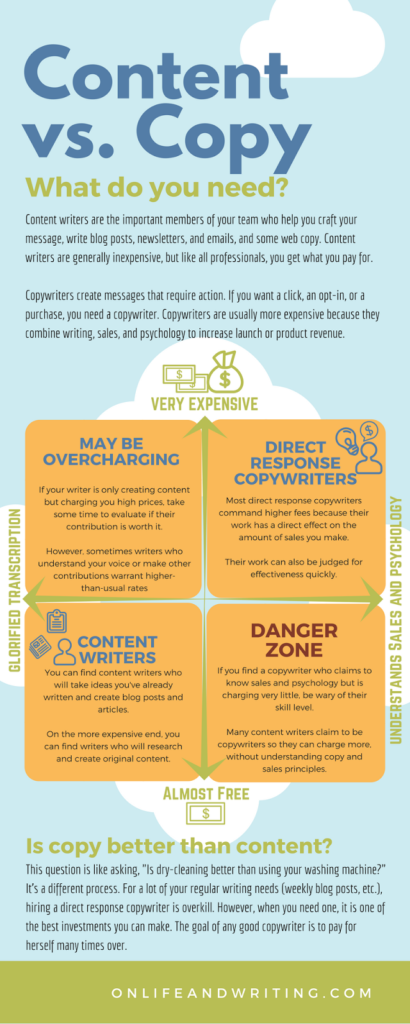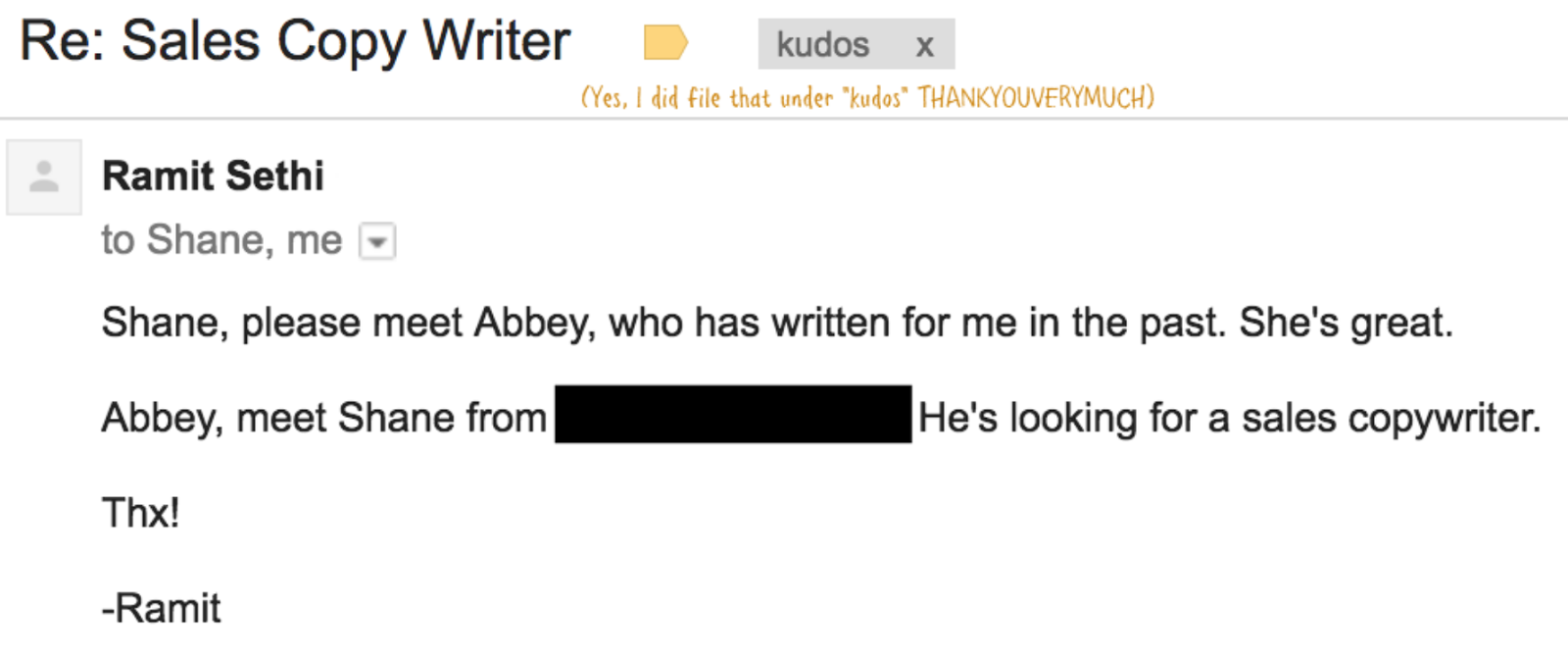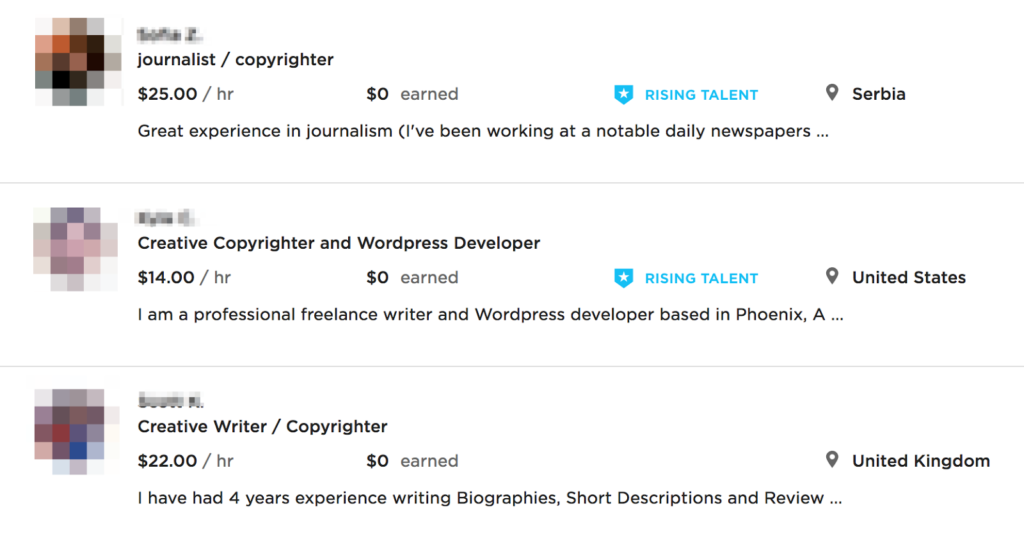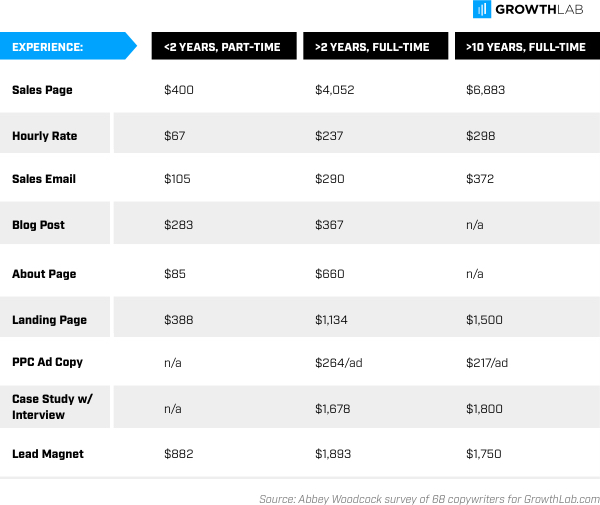
How to hire a copywriter the RIGHT way (real advice from 6-figure copywriter Abbey Woodcock)
Your hunch was right.
There’s too much to write, and not enough people to write it.
How did I know you thought that? Because just about every business owner I know feels that way. And the numbers back it up. In 2017, businesses spent an estimated $205 billion on internet ads and wrote more than 2 million blog posts per day and sent 124.5 billion emails every day.
That’s a lot of words that need to be written by someone, and I’m going to help you out:
In this post, let’s first dispel some myths and misconceptions about copywriters. I’ll then reveal the results of a pricing survey so you know exactly what to pay, and then we’ll break down how to hire a copywriter without overpaying or setting yourself up for frustration.
For a one-person business, there’s emails, blog posts, website pages, social media posts (have you lost count of the channels yet?), presentations, video scripts, webinars, sales pages, opt-in forms … the list goes on and on.
And all this demand for copy has created a bigger problem if you’re looking to hire a writer.
You see, the copywriting industry has no central certifying body or universally recognized training path. So there’s a ton of opportunity, low barrier to entry, and no standardized pricing.
Combine that with the fact that many think they just naturally “get” how to write great copy, and all it takes for someone to “become a copywriter” is a $10 book and the word “copywriter” slapped on their website.
This all creates a confusing and costly landscape for you.
Because there are no standards, the range is extremely wide for both experience and pricing (and the two don’t necessarily correlate).
The current culture around copy encourages people to charge very high prices … while learning the craft and creating quality work is secondary. Which is heartbreaking to me because I’ve seen what great copy can do for a business.
I’ve worked with some of the best. People like IWT CEO Ramit Sethi, Ryan Levesque, and Jeff Walker, who regularly have multimillion-dollar launches. I’ve worked on launches with 187 separate copy deliverables (yes, that’s a real number), written sales letters for direct-mail powerhouses like Agora, and even launched my own products.
And lately, I’ve been working with seven- and eight-figure businesses to build out their content and copy teams. Like you, these businesses, despite having great success hiring for other positions, are confused and frustrated about where to find and how to hire great copywriters. (And in many cases, they overpay for mediocre talent.)
Step 1: Figure out if you even need a copywriter
There are two types of people who come to me looking for a “copywriter” who don’t actually need a copywriter.
The first is the Mr. Desperate-For-Conversions. Often this is someone who has just launched their first product to crickets. They did all the “right” things — created a sales page, sent emails, ran a webinar — and instead of getting the $5 million launch they were expecting, they got two sales.
“It must be the copy!” they think. And they go out searching for “the very best” direct-response copywriter to rewrite their sales page.
Here’s a secret: copy can’t save a bad product or bad marketing. If you don’t have a good list or a marketing strategy, I could channel all the Eugene Schwartz and David Ogilvy I can muster and you won’t get any more sales.
And if your offer is no good (you’re selling something people don’t want, you don’t understand your numbers, and/or you haven’t done any market research), copy won’t fix that either.
This situation sets up both the copywriter and the business owner for a lot of frustration. A good copywriter will ask some key questions before you even start working together.
At a minimum, during your first call or two, the copywriter will want to know about your current copy and what you like/dislike about it; info about your business like voice, market, strengths, and programs; testimonials from current/former students; your goals for the project (why are you writing the copy, to whom, and with what result).
They’ll also ask what your marketing and traffic strategy is, who you’re targeting, and all the details about the offer. I have 50+ questions I need answered before any project starts.
Many copy and conversion problems are actually product development problems in disguise. So before you look for a copywriter, evaluate your offer. (HINT: A tell-tale sign of a bad offer is buyer’s remorse. Do you have high refund rates? Are you inundated with customer service tickets AFTER the sale?) You can also glean a lot of insight from both buyer and non-buyer surveys — there are two great scripts here.
So on the first call with a potential copywriter, ask yourself:
- Does the copywriter ask a lot of questions during the prospecting process? At a minimum, a good copywriter will want to know about your current copy and what you like/dislike about it; info about your business, voice, market, strengths, and programs; testimonials from current/former students; your goals for the project (why are you writing the copy, to whom, and with what result).
- Have they given you new insight about your promotion or product?
- Do they seem excited about the project? (If you feel like you’re “just another client” in the beginning, you can expect communication problems down the road.)
The second type of person who comes looking for a copywriter is Mr. This-Just-Needs-To-Get-Published.
Most of the time, this person isn’t actually looking for a copywriter at all. What they really need is a content writer. They have a high volume of needs (daily emails, guest posts, blogs, etc.) of what’s called “top of the funnel” writing.
Here’s the difference:
Direct response copywriters combine sales psychology, human behavior, and writing to make people take action. They write things like sales pages, landing pages, and ads. This writing has to convert.
A content writer is someone who writes things like blog posts, articles, and YouTube descriptions. This writing summarizes, engages, introduces, and educates. Often, these are the bulk of the business needs.
If you need a content writer and approach direct response copywriters, you’ll be overwhelmed by the prices you’re quoted.

Step 2: Know where to look for a copywriter
As I mentioned above, just about anyone can put “copywriter” on their website. And they can do the same for their profile on Upwork, LinkedIn, Fiverr, Facebook, or wherever else they advertise their services.
You can find low-cost copywriters (or more often, content writers) in all of those places. But to shortcut the costly trial-and-error, try these options instead.
OPTION 1: Find copy you like and reach out to find the writer
Most of your favorite online businesses have a team of copywriters who help produce the incredible copy you see. And while some of the time they are full-time employees and don’t have the bandwidth to take on new projects, they are often freelancers.
For example, Ramit didn’t create this $5-million week on his own. The volume of copy was staggering! (I know, because I happened to be on that team.) One person would never be able to write all that himself.
You can often reach out and find out who your colleagues and mentors work with, and get connected. People are generally happy to connect great people with each other.
OPTION 2: Play the Kevin Bacon game
Here’s where you’ll run into a sticking point on option 1 — if a copywriter is already working on high-level teams, they often have more work than they can handle. That’s the bad news.
The good news is Kevin Bacon.
Have you heard of that game, “Six Degrees of Kevin Bacon”? The theory goes that every person in Hollywood can be connected to Kevin Bacon by six people or less. (Fun fact: I’m only two degrees away, as a good friend of mine trained dogs on set with Kevin once!)
The point is, in every industry, people are connected.
Great copywriters know great copywriters. The referral Ramit sent me above? It didn’t end up being the right fit for me at the time. But, I connected Shane to a colleague of mine and they walked off hand-in-hand into the sunset.
If someone tells you they can’t take you on as a client, the next email from you should be:
“Awww, too bad! Do you know anyone who might be a fit?”
…but you don’t have to take the same path as everyone else. How would it look if you designed a Rich Life on your own terms? Take our quiz and find out:
OPTION 3: My “Ace in the Hole”
There are a lot of places where wanna-be copywriters hang out. But, only one place I know that’s filled with pro-level copywriters.
The difference between this forum and others is that it’s a paid site. This keeps out the “copywriting!? I don’t know what it is, but I bet I can do it” crowd. Both business owners and copywriters have to pay a fee to join, but it is well worth it for both sides of the table.
There’s a built-in job board, an opportunity to have any piece of copy critiqued, and even a vetted group of recommended copywriters.
It’s run by a mentor of mine, Kevin Rogers, and is found at copychief.com.
I’ve hired copywriters from Copy Chief and also found clients and partners there. Kevin opens it up to new members about once a month.
Here are a few questions to ask after you’ve connected with a potential copywriter:
- Can you view copy samples or get in touch with their former clients?
- Do they have proven experience in your niche or similar niches?
- During conversations, did they come prepared, having reviewed your material? (At minimum, they should do an “audit” of your website and have a good understanding of what you do.)
Step 3: Know what to pay your copywriter
Definitions to know for this section:
- Royalty: A percentage of sales paid to a copywriter when the promotion goes live (typically paid after the refund period is over).
- Retainer: A monthly, quarterly, or yearly agreement to provide a certain amount of service (measured either hourly or by amount of product produced) on a regular basis.
Recently, I set out to answer the “how much?” question definitively. There are a lot of copy pricing guides out there. And after reviewing a half-a-dozen of them, I discovered they were arbitrary at best and misleading at worst.
Either they were based solely on the author’s experience, or they surveyed our aforementioned “buy a book and slap on a title” copywriters. I don’t know about you, but I’m not really interested in what someone charges who hasn’t even figured out that it’s spelled “copywriter” and not “copyrighter.”

So, I surveyed 68 of my colleagues — copywriters who I knew had actual, paying clients online. And I asked them what they charged for 14 different types of common projects.
The range was insane.
Let’s take online sales pages for example. The range started at $50 and went up to $17,000 + royalties.
That’s not helpful for anyone, so I dug in to answer, what’s reasonable? First I took out “side hustlers” — those who said copywriting was not their main source of income (13%). Then, I took out all data for copywriters working less than two years, since many were still working out their prices and the ranges were least consistent during that time frame. The results then made a little bit more sense.
As you would imagine, the average prices go up each year across most services.
It was also interesting to note that only copywriters working less than two years listed “per word” or “per hour” responses to project estimates.
A few other notes on this survey:
Remember this is for freelance copywriters (not content writers) on a per-project basis.
Freelancers typically have higher rates because they don’t receive employee benefits, they pay for their own equipment and office space, and have to budget in the time it takes them to acquire clients into their annual salary.
Hourly rates will be much lower for in-house copywriters or long-term retainer relationships. If you have a lot of copy or content needs, you’ll save a lot of money over the long term hiring a full-time employee or even a copywriter on retainer.
When negotiating price with a copywriter, ask yourself the following:
- Do they offer you a range of prices and/or packages?
- Do their prices seem to match their experience level? (Quoting too low can be as much of a red flag as too high.)
- Are they listening to your suggestions and goals or set on proceeding in a certain way? (A copywriter should be like a partner — combining their expertise with yours.)
- Do they respond in a timely fashion to comments, questions, and suggestions? (If they are slow to respond before you’ve said yes, can you imagine how communication is going to be once they have your money??)
To sum it up: A 10-point checklist for hiring a copywriter
Whatever your needs are and wherever you find your copywriter, there are some things that signal red flags across the industry. They’re pretty easy to identify when you know what to look for.
Here are 10 questions you should ask yourself when hiring a copywriter:
On the first call:
- Does the copywriter ask a lot of questions during the prospecting process? At a minimum, a good copywriter will want to know about your current copy and what you like/dislike about it; info about your business, voice, market, strengths, and programs; testimonials from current/former students; your goals for the project (why are you writing the copy, to whom, and with what result).
- During your first call or two, have they given you new insight about your promotion or product?
- Do they seem excited about the project? (If you feel like you’re “just another client” in the beginning, you can expect communication problems down the road.)
During the hiring process:
- Can you view copy samples or get in touch with their former clients?
- Do they have proven experience in your niche or similar niches?
- During conversations, did they come prepared, having reviewed your material? (At minimum, they should do an “audit” of your website and have a good understanding of what you do.)
During negotiations:
- Do they offer you a range of prices and/or packages?
- Do their prices seem to match their experience level? (Quoting too low can be as much of a red flag as too high.)
- Are they listening to your suggestions and goals or set on proceeding in a certain way? (A copywriter should be like a partner — combining their expertise with yours.)
- Do they respond in a timely fashion to comments, questions, and suggestions? (If they are slow to respond before you’ve said yes, can you imagine how communication is going to be once they have your money??)
When copy works it can be one of the single biggest growth levers in your business. I’ve seen it, I’ve experienced it. And there are so many great copywriters out there looking for a partner like you to make magic with.
If you liked this post, you’d LOVE my Ultimate Guide to Getting A Raise
It’s one of the best things I’ve published, and totally free – just tell me where to send it:
Host of Netflix’s “How To Get Rich” NYT Bestselling Author, & Host of the I Will Teach You To Be Rich Podcast. I’ll show you how to take control of your money with my proven strategies so you can live your RICH LIFE.
Written by Ramit Sethi
Host of Netflix’s “How To Get Rich” NYT Bestselling Author, & Host of the I Will Teach You To Be Rich Podcast. I’ll show you how to take control of your money with my proven strategies so you can live your RICH LIFE.



